 At its heart, MIXED is an exploration of racial and cultural identity. MIXED deals specifically with people that have mixed heritage, delving into the experiences of each subject that also echo his own. The series addresses the existential feeling of not fully belonging, while examining the cost of assimilation within society. The conversations focus especially on the contradiction of fitting in everywhere but nowhere at the same time and the resulting shoot is a collaboration that encompasses the themes considered.
At its heart, MIXED is an exploration of racial and cultural identity. MIXED deals specifically with people that have mixed heritage, delving into the experiences of each subject that also echo his own. The series addresses the existential feeling of not fully belonging, while examining the cost of assimilation within society. The conversations focus especially on the contradiction of fitting in everywhere but nowhere at the same time and the resulting shoot is a collaboration that encompasses the themes considered.
Stages
02.11.2022 | by Theo Gould
 This exhibition presents around 60 works by 21 artists whose family origins lie in the former colonies in Africa. Born and raised in a post-colonial context, they are artists whose works have become unavoidable in European contemporary art, proposing a reflection on their heritage, their memories and their identities.
This exhibition presents around 60 works by 21 artists whose family origins lie in the former colonies in Africa. Born and raised in a post-colonial context, they are artists whose works have become unavoidable in European contemporary art, proposing a reflection on their heritage, their memories and their identities.
To read
01.11.2022 | by Marta Lança
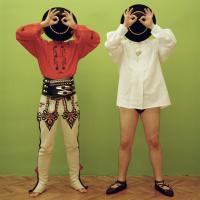 The exhibition, which aims to give voice to a young generation of photographers in Poland, also includes the work of Irena Kalicka, a young artist who is critical of her country’s tendency to turn to the extreme right. I had the opportunity to present a photograph of her in the magazine “Fantasia Macau” last year.
The exhibition, which aims to give voice to a young generation of photographers in Poland, also includes the work of Irena Kalicka, a young artist who is critical of her country’s tendency to turn to the extreme right. I had the opportunity to present a photograph of her in the magazine “Fantasia Macau” last year.
To read
21.10.2022 | by Cheong Kin Man
 I think we always have the responsibility of looking into the ghosts of these colonial dreams and taking the ideas further. For example, we must rethink what are artwork features and what exactly defines them? Institutions change, in a slow and tedious way, but it happens. If we also think about the thesis and how it is configurated, how free can we be about the aesthetic part of it? Now we can offer “decolonize art studies” as a course. All the reconfigurations are a very long process to be achieved. A very important thing I would like to highlight is that where you are you must do your work and contribution. We should try to influence others with our work, inspiring them and trying to change what we know is wrong.
I think we always have the responsibility of looking into the ghosts of these colonial dreams and taking the ideas further. For example, we must rethink what are artwork features and what exactly defines them? Institutions change, in a slow and tedious way, but it happens. If we also think about the thesis and how it is configurated, how free can we be about the aesthetic part of it? Now we can offer “decolonize art studies” as a course. All the reconfigurations are a very long process to be achieved. A very important thing I would like to highlight is that where you are you must do your work and contribution. We should try to influence others with our work, inspiring them and trying to change what we know is wrong.
Face to face
18.03.2022 | by Arimilde Soares
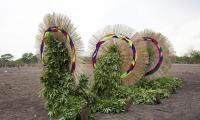 In the contemporary discussions regarding post-colonial Europe, the concepts of memory and post- memory have taken on growing importance, giving prominence to an insight with great political relevance: colonialism never ends with those who enforced or suffered it. Traces of a colonial mindset impregnate generations to come and it has been passed down through the image of the former coloniser and the former colonised. These characters restage a complex phantasmagoria closely related to the most intimate ghost of the European subconscious: its colonial ghost which manifests itself inter alia in the form of a colonial “transfer of memory” – as racism, segregation, exclusion, subalternity – or in the form of “eruptions of memory”, and thereby questions the very essence of European multicultural societies, shaped by colonial heritage and fed by waves of migration.
In the contemporary discussions regarding post-colonial Europe, the concepts of memory and post- memory have taken on growing importance, giving prominence to an insight with great political relevance: colonialism never ends with those who enforced or suffered it. Traces of a colonial mindset impregnate generations to come and it has been passed down through the image of the former coloniser and the former colonised. These characters restage a complex phantasmagoria closely related to the most intimate ghost of the European subconscious: its colonial ghost which manifests itself inter alia in the form of a colonial “transfer of memory” – as racism, segregation, exclusion, subalternity – or in the form of “eruptions of memory”, and thereby questions the very essence of European multicultural societies, shaped by colonial heritage and fed by waves of migration.
To read
31.10.2021 | by Margarida Calafate Ribeiro
 The exhibition Europa Oxalá is also the ideal time to deconstruct the colonial myth and the post-colonial melancholy designated as “African art”. Attributed to all artistic production that originates in the African continent, the expression has been used to differentiate it in a coarse way from all the art included in the compendiums and narratives of the universal history of art founded in the Western matrix. So-called African art was seen as an art without authorship, disconnected from the diversity of its production contexts, be they a country of North Africa, of the South or the east or west coast, be it the 14th or 20th century.
The exhibition Europa Oxalá is also the ideal time to deconstruct the colonial myth and the post-colonial melancholy designated as “African art”. Attributed to all artistic production that originates in the African continent, the expression has been used to differentiate it in a coarse way from all the art included in the compendiums and narratives of the universal history of art founded in the Western matrix. So-called African art was seen as an art without authorship, disconnected from the diversity of its production contexts, be they a country of North Africa, of the South or the east or west coast, be it the 14th or 20th century.
To read
18.10.2021 | by António Pinto Ribeiro
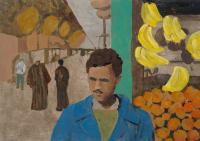 It’s a common place to say that the memory production drags with it, inevitably and concomitantly, the forgetfulness production. There are many ways of forgetfulness, the most insidious of which is, undoubtedly, the memory erasure, the past rewriting as part of a deliberated strategy of intervention in the present.
It’s a common place to say that the memory production drags with it, inevitably and concomitantly, the forgetfulness production. There are many ways of forgetfulness, the most insidious of which is, undoubtedly, the memory erasure, the past rewriting as part of a deliberated strategy of intervention in the present.
Games Without Borders
13.03.2021 | by António Sousa Ribeiro
 Somewhere in between there is something more human that tries to understand these people, imagine if you had to flee your home and you could one carry one thing with you, how would you continue to be yourself? On top of fleeing and experiencing a traumatic conflict you turn up in a place that is supposed to be civilized and you get treated like an abomination. This project is about to try to humanize migrants and make them individuals and real people, our friends, our neighbors.
Somewhere in between there is something more human that tries to understand these people, imagine if you had to flee your home and you could one carry one thing with you, how would you continue to be yourself? On top of fleeing and experiencing a traumatic conflict you turn up in a place that is supposed to be civilized and you get treated like an abomination. This project is about to try to humanize migrants and make them individuals and real people, our friends, our neighbors.
Face to face
26.11.2020 | by Alícia Gaspar and Rachael Kiddey
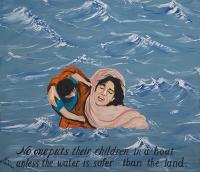 It has to do with the colonial history of Europe as a whole: I see this phenomenon of migration from the global south to the global north as the latest phase in the long history of racialized capitalism and colonialism. Many of these people who are trying to cross are coming from previously colonized countries by Europe. We know that, that long history of colonization has an impact in the present in terms of structural inequality, poverty, dispossession and war, and at the same time that we are seeing is the inability of Europe to come to terms with its own history. Which is a history of colonization, of course, instigated by proto-capitalism and capitalist developments as well as the hierarchy of racialization and the legacy of whiteness and white supremacy which fueled the whole colonial condition.
It has to do with the colonial history of Europe as a whole: I see this phenomenon of migration from the global south to the global north as the latest phase in the long history of racialized capitalism and colonialism. Many of these people who are trying to cross are coming from previously colonized countries by Europe. We know that, that long history of colonization has an impact in the present in terms of structural inequality, poverty, dispossession and war, and at the same time that we are seeing is the inability of Europe to come to terms with its own history. Which is a history of colonization, of course, instigated by proto-capitalism and capitalist developments as well as the hierarchy of racialization and the legacy of whiteness and white supremacy which fueled the whole colonial condition.
Face to face
25.11.2020 | by Alícia Gaspar and Yannis Hamilakis
 Why does Europe (still) have such trouble showing a coherent attitude in the face of discourses which legitimate racism and xenophobia? What are the masks that stop it from accepting its colonial past and understanding, once and for all, that diasporas are part of the richness of the European cultural map?
Why does Europe (still) have such trouble showing a coherent attitude in the face of discourses which legitimate racism and xenophobia? What are the masks that stop it from accepting its colonial past and understanding, once and for all, that diasporas are part of the richness of the European cultural map?
To read
22.06.2019 | by Felipe Cammaert
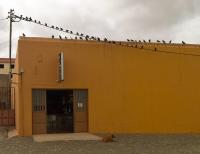 They are stories from which the narrator takes on the ambiguities of the discourses of negritude and whiteness, racism and antiracism, the plasticity of discrimination, the trap of stereotype, and the awareness of prejudice. These are stories that point us to a common past made up of very different memories.
They are stories from which the narrator takes on the ambiguities of the discourses of negritude and whiteness, racism and antiracism, the plasticity of discrimination, the trap of stereotype, and the awareness of prejudice. These are stories that point us to a common past made up of very different memories.
To read
02.10.2018 | by Margarida Calafate Ribeiro
 For centuries enslaved Africans were taken to Europe and America to serve as workforce. These individuals were forced into submission and considered sub-human. They were brutalized and treated worse than animals by other individuals, and their institutions, which thought of themselves as civilized and modern. These enslaved men and women suffered and despaired, and dreamt of a life before, and of a land more familiar and kind. So, out of the insanity of misery and helplessness, they would eat the soil in the hope of being taken back to that time and land of before.
For centuries enslaved Africans were taken to Europe and America to serve as workforce. These individuals were forced into submission and considered sub-human. They were brutalized and treated worse than animals by other individuals, and their institutions, which thought of themselves as civilized and modern. These enslaved men and women suffered and despaired, and dreamt of a life before, and of a land more familiar and kind. So, out of the insanity of misery and helplessness, they would eat the soil in the hope of being taken back to that time and land of before.
I'll visit
10.11.2016 | by Ana Rita Canhão
 At its heart, MIXED is an exploration of racial and cultural identity. MIXED deals specifically with people that have mixed heritage, delving into the experiences of each subject that also echo his own. The series addresses the existential feeling of not fully belonging, while examining the cost of assimilation within society. The conversations focus especially on the contradiction of fitting in everywhere but nowhere at the same time and the resulting shoot is a collaboration that encompasses the themes considered.
At its heart, MIXED is an exploration of racial and cultural identity. MIXED deals specifically with people that have mixed heritage, delving into the experiences of each subject that also echo his own. The series addresses the existential feeling of not fully belonging, while examining the cost of assimilation within society. The conversations focus especially on the contradiction of fitting in everywhere but nowhere at the same time and the resulting shoot is a collaboration that encompasses the themes considered.  This exhibition presents around 60 works by 21 artists whose family origins lie in the former colonies in Africa. Born and raised in a post-colonial context, they are artists whose works have become unavoidable in European contemporary art, proposing a reflection on their heritage, their memories and their identities.
This exhibition presents around 60 works by 21 artists whose family origins lie in the former colonies in Africa. Born and raised in a post-colonial context, they are artists whose works have become unavoidable in European contemporary art, proposing a reflection on their heritage, their memories and their identities.  The exhibition, which aims to give voice to a young generation of photographers in Poland, also includes the work of Irena Kalicka, a young artist who is critical of her country’s tendency to turn to the extreme right. I had the opportunity to present a photograph of her in the magazine “Fantasia Macau” last year.
The exhibition, which aims to give voice to a young generation of photographers in Poland, also includes the work of Irena Kalicka, a young artist who is critical of her country’s tendency to turn to the extreme right. I had the opportunity to present a photograph of her in the magazine “Fantasia Macau” last year.  I think we always have the responsibility of looking into the ghosts of these colonial dreams and taking the ideas further. For example, we must rethink what are artwork features and what exactly defines them? Institutions change, in a slow and tedious way, but it happens. If we also think about the thesis and how it is configurated, how free can we be about the aesthetic part of it? Now we can offer “decolonize art studies” as a course. All the reconfigurations are a very long process to be achieved. A very important thing I would like to highlight is that where you are you must do your work and contribution. We should try to influence others with our work, inspiring them and trying to change what we know is wrong.
I think we always have the responsibility of looking into the ghosts of these colonial dreams and taking the ideas further. For example, we must rethink what are artwork features and what exactly defines them? Institutions change, in a slow and tedious way, but it happens. If we also think about the thesis and how it is configurated, how free can we be about the aesthetic part of it? Now we can offer “decolonize art studies” as a course. All the reconfigurations are a very long process to be achieved. A very important thing I would like to highlight is that where you are you must do your work and contribution. We should try to influence others with our work, inspiring them and trying to change what we know is wrong.  In the contemporary discussions regarding post-colonial Europe, the concepts of memory and post- memory have taken on growing importance, giving prominence to an insight with great political relevance: colonialism never ends with those who enforced or suffered it. Traces of a colonial mindset impregnate generations to come and it has been passed down through the image of the former coloniser and the former colonised. These characters restage a complex phantasmagoria closely related to the most intimate ghost of the European subconscious: its colonial ghost which manifests itself inter alia in the form of a colonial “transfer of memory” – as racism, segregation, exclusion, subalternity – or in the form of “eruptions of memory”, and thereby questions the very essence of European multicultural societies, shaped by colonial heritage and fed by waves of migration.
In the contemporary discussions regarding post-colonial Europe, the concepts of memory and post- memory have taken on growing importance, giving prominence to an insight with great political relevance: colonialism never ends with those who enforced or suffered it. Traces of a colonial mindset impregnate generations to come and it has been passed down through the image of the former coloniser and the former colonised. These characters restage a complex phantasmagoria closely related to the most intimate ghost of the European subconscious: its colonial ghost which manifests itself inter alia in the form of a colonial “transfer of memory” – as racism, segregation, exclusion, subalternity – or in the form of “eruptions of memory”, and thereby questions the very essence of European multicultural societies, shaped by colonial heritage and fed by waves of migration.  The exhibition Europa Oxalá is also the ideal time to deconstruct the colonial myth and the post-colonial melancholy designated as “African art”. Attributed to all artistic production that originates in the African continent, the expression has been used to differentiate it in a coarse way from all the art included in the compendiums and narratives of the universal history of art founded in the Western matrix. So-called African art was seen as an art without authorship, disconnected from the diversity of its production contexts, be they a country of North Africa, of the South or the east or west coast, be it the 14th or 20th century.
The exhibition Europa Oxalá is also the ideal time to deconstruct the colonial myth and the post-colonial melancholy designated as “African art”. Attributed to all artistic production that originates in the African continent, the expression has been used to differentiate it in a coarse way from all the art included in the compendiums and narratives of the universal history of art founded in the Western matrix. So-called African art was seen as an art without authorship, disconnected from the diversity of its production contexts, be they a country of North Africa, of the South or the east or west coast, be it the 14th or 20th century.  It’s a common place to say that the memory production drags with it, inevitably and concomitantly, the forgetfulness production. There are many ways of forgetfulness, the most insidious of which is, undoubtedly, the memory erasure, the past rewriting as part of a deliberated strategy of intervention in the present.
It’s a common place to say that the memory production drags with it, inevitably and concomitantly, the forgetfulness production. There are many ways of forgetfulness, the most insidious of which is, undoubtedly, the memory erasure, the past rewriting as part of a deliberated strategy of intervention in the present.  Somewhere in between there is something more human that tries to understand these people, imagine if you had to flee your home and you could one carry one thing with you, how would you continue to be yourself? On top of fleeing and experiencing a traumatic conflict you turn up in a place that is supposed to be civilized and you get treated like an abomination. This project is about to try to humanize migrants and make them individuals and real people, our friends, our neighbors.
Somewhere in between there is something more human that tries to understand these people, imagine if you had to flee your home and you could one carry one thing with you, how would you continue to be yourself? On top of fleeing and experiencing a traumatic conflict you turn up in a place that is supposed to be civilized and you get treated like an abomination. This project is about to try to humanize migrants and make them individuals and real people, our friends, our neighbors.  It has to do with the colonial history of Europe as a whole: I see this phenomenon of migration from the global south to the global north as the latest phase in the long history of racialized capitalism and colonialism. Many of these people who are trying to cross are coming from previously colonized countries by Europe. We know that, that long history of colonization has an impact in the present in terms of structural inequality, poverty, dispossession and war, and at the same time that we are seeing is the inability of Europe to come to terms with its own history. Which is a history of colonization, of course, instigated by proto-capitalism and capitalist developments as well as the hierarchy of racialization and the legacy of whiteness and white supremacy which fueled the whole colonial condition.
It has to do with the colonial history of Europe as a whole: I see this phenomenon of migration from the global south to the global north as the latest phase in the long history of racialized capitalism and colonialism. Many of these people who are trying to cross are coming from previously colonized countries by Europe. We know that, that long history of colonization has an impact in the present in terms of structural inequality, poverty, dispossession and war, and at the same time that we are seeing is the inability of Europe to come to terms with its own history. Which is a history of colonization, of course, instigated by proto-capitalism and capitalist developments as well as the hierarchy of racialization and the legacy of whiteness and white supremacy which fueled the whole colonial condition.  Why does Europe (still) have such trouble showing a coherent attitude in the face of discourses which legitimate racism and xenophobia? What are the masks that stop it from accepting its colonial past and understanding, once and for all, that diasporas are part of the richness of the European cultural map?
Why does Europe (still) have such trouble showing a coherent attitude in the face of discourses which legitimate racism and xenophobia? What are the masks that stop it from accepting its colonial past and understanding, once and for all, that diasporas are part of the richness of the European cultural map?  They are stories from which the narrator takes on the ambiguities of the discourses of negritude and whiteness, racism and antiracism, the plasticity of discrimination, the trap of stereotype, and the awareness of prejudice. These are stories that point us to a common past made up of very different memories.
They are stories from which the narrator takes on the ambiguities of the discourses of negritude and whiteness, racism and antiracism, the plasticity of discrimination, the trap of stereotype, and the awareness of prejudice. These are stories that point us to a common past made up of very different memories.  For centuries enslaved Africans were taken to Europe and America to serve as workforce. These individuals were forced into submission and considered sub-human. They were brutalized and treated worse than animals by other individuals, and their institutions, which thought of themselves as civilized and modern. These enslaved men and women suffered and despaired, and dreamt of a life before, and of a land more familiar and kind. So, out of the insanity of misery and helplessness, they would eat the soil in the hope of being taken back to that time and land of before.
For centuries enslaved Africans were taken to Europe and America to serve as workforce. These individuals were forced into submission and considered sub-human. They were brutalized and treated worse than animals by other individuals, and their institutions, which thought of themselves as civilized and modern. These enslaved men and women suffered and despaired, and dreamt of a life before, and of a land more familiar and kind. So, out of the insanity of misery and helplessness, they would eat the soil in the hope of being taken back to that time and land of before. 